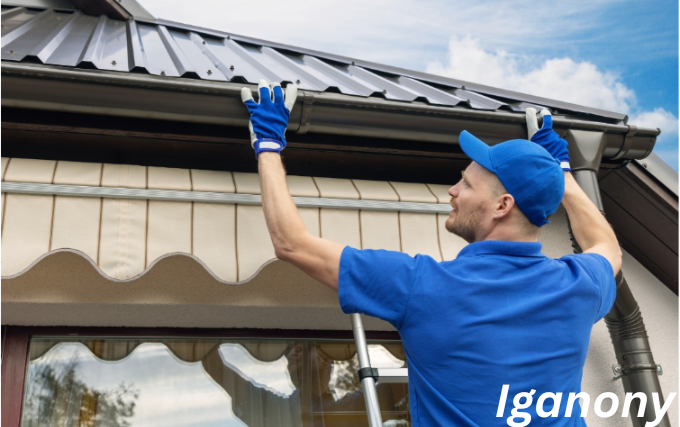Gutter cleaning is a routine part of home maintenance that most UK homeowners are familiar with, but few consider the environmental impact of this seemingly straightforward task. As awareness of sustainability and environmental responsibility grows, so does the demand for greener, eco-friendly solutions in every industry—including gutter cleaning.
In this detailed blog, we’ll explore the environmental effects of gutter cleaning, the challenges it presents, and how sustainable practices and innovations are transforming the way gutter cleaning services operate in the UK.
Why Gutter Cleaning Matters Environmentally
At first glance, gutter cleaning might seem like a minor household chore with little impact beyond your property’s maintenance. However, it intersects with the environment in multiple ways:
1. Waste Disposal and Debris Management
During gutter cleaning, large quantities of organic debris—leaves, moss, twigs, bird nests—are removed. If this waste is disposed of improperly (such as sent to landfill), it contributes to environmental degradation. Some cleaning companies, especially those with eco-conscious approaches, compost or recycle this organic waste, turning it into valuable soil enhancer rather than trash.
2. Water Quality and Pollution Prevention
Blocked gutters cause water overflow that can carry pollutants from roofs (like bird droppings, moss, algae) into soil and waterways. Proper gutter maintenance helps manage runoff cleanly, reducing the risk of local water contamination, particularly important in urban or ecologically sensitive areas.
3. Use of Chemicals and Cleaning Agents
Some gutter cleaning methods involve detergents, moss killers, or other chemicals. Overuse or improper application can result in harmful substances entering gardens and water systems. Sustainable gutter cleaning minimizes or eliminates chemical use, relying instead on physical removal or eco-friendly alternatives.
Environmental Challenges in Traditional Gutter Cleaning
While essential, traditional gutter cleaning has some environmental drawbacks:
- Fuel and Emissions: Professional gutter cleaning often involves vans, trucks, and machinery that use fossil fuels, contributing to carbon emissions.
- Waste Generation: Non-biodegradable waste like plastics, packaging from cleaning supplies, and synthetic gutter guards can add to landfill.
- Water Use: Pressure washing gutters can consume large amounts of water if not managed carefully.
- Chemical Pollution: Some moss treatments and cleaning agents contain harmful chemicals.
Recognizing these impacts is the first step toward greener solutions.
How Sustainable Practices Are Changing the Gutter Cleaning Industry
Fortunately, many UK gutter cleaning companies are adopting sustainable methods to reduce environmental impact while maintaining high service standards.
1. Eco-Friendly Waste Disposal
Progressive companies sort debris collected during cleaning and either compost it on-site or take it to organic waste recycling centres. This reduces landfill contributions and creates useful compost for gardens and farms.
2. Chemical-Free Cleaning Methods
Instead of relying on harsh chemicals, sustainable gutter cleaners use mechanical removal tools such as brushes, vacuums, and scraping tools to clear gutters. Where moss or algae are present, they may use eco-friendly biological treatments derived from natural ingredients, which break down safely without harming the environment.
3. Use of Electric and Hybrid Vehicles
To reduce carbon emissions, some gutter cleaning firms have begun transitioning their vehicle fleets to electric or hybrid models. This shift helps lower the overall carbon footprint of the service and aligns with the UK’s broader climate goals.
4. Water Conservation Techniques
Modern gutter cleaning often employs low-water or waterless cleaning techniques. When water is used—for flushing debris, for example—companies aim to minimise usage by recycling rinse water or using precise spraying tools.
5. Promoting Gutter Guards Made from Recycled Materials
Sustainable gutter guards made from recycled plastics or metals help reduce new resource consumption. These guards not only reduce debris build-up but also extend the interval between cleanings, reducing overall environmental impact.
Benefits of Choosing Sustainable Gutter Cleaning
Opting for environmentally responsible gutter cleaning services has multiple benefits:
- Protects Local Ecosystems: Prevents contamination of soil and watercourses.
- Reduces Carbon Footprint: Supports the fight against climate change.
- Conserves Natural Resources: Through better water and waste management.
- Enhances Community Health: Less chemical exposure and pollution.
- Long-Term Cost Savings: Eco-friendly methods often extend gutter lifespan and reduce the need for repairs.
By supporting green businesses, consumers help shift the entire industry toward sustainability.
What Homeowners Can Do to Promote Sustainable Gutter Maintenance
While many practices depend on professional services, homeowners can also contribute:
- Choose eco-conscious gutter cleaners: Ask about their environmental policies and practices.
- Minimise chemical use: Avoid DIY chemical treatments; opt for mechanical cleaning where possible.
- Install eco-friendly gutter guards: Select products made from recycled or sustainable materials.
- Regularly maintain gutters: Prevent blockages that cause water overflow and damage to local ecosystems.
- Dispose of yard waste responsibly: Compost leaves and organic matter from gutter cleaning rather than throwing them in general waste.
The Future of Gutter Cleaning: Technology and Sustainability
Technology continues to shape how gutter cleaning can be more sustainable:
- Robotics and Drones: Emerging tools can inspect and clean gutters remotely, reducing the need for vehicles and physical access.
- Smart Sensors: Sensors installed in gutters monitor debris build-up and water flow, alerting homeowners when cleaning is necessary, optimising cleaning schedules and reducing unnecessary trips.
- Bio-based Sealants and Repairs: Innovations in eco-friendly repair materials reduce the environmental footprint of gutter maintenance.
The industry’s future looks promising as sustainability becomes integral to all aspects of gutter care.
Conclusion
Gutter cleaning might seem like a simple maintenance task, but it holds a significant place in environmental stewardship, especially in the UK’s wet and leafy environment. Traditional methods have environmental downsides, but the rise of sustainable practices—from eco-friendly waste disposal to low-impact cleaning techniques—is transforming the industry.
By choosing greener gutter cleaning services and adopting sustainable habits, homeowners not only protect their properties but also contribute to a healthier planet. The growing demand for sustainability in home services reflects a wider societal shift that benefits everyone.
If you’re looking for gutter cleaning services, consider companies that prioritise environmental responsibility—your home, your community, and the planet will thank you.







